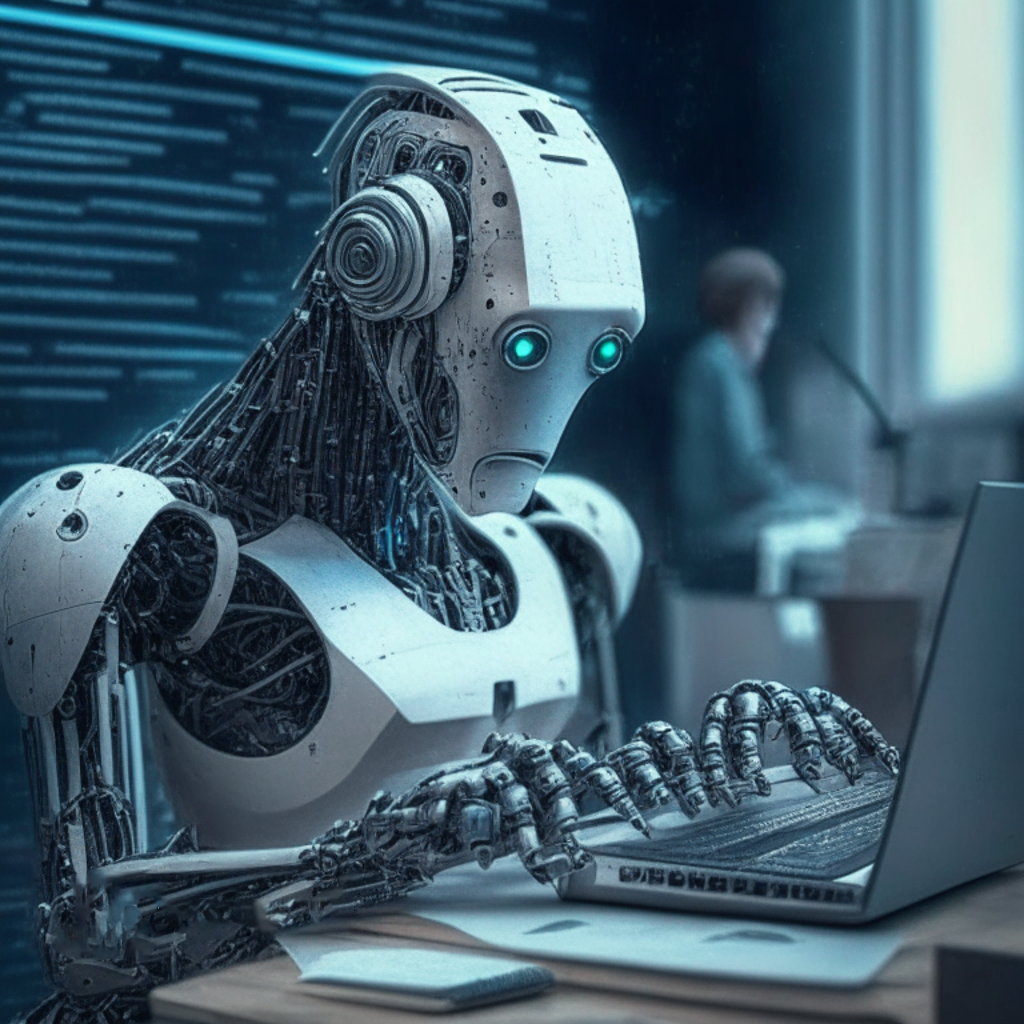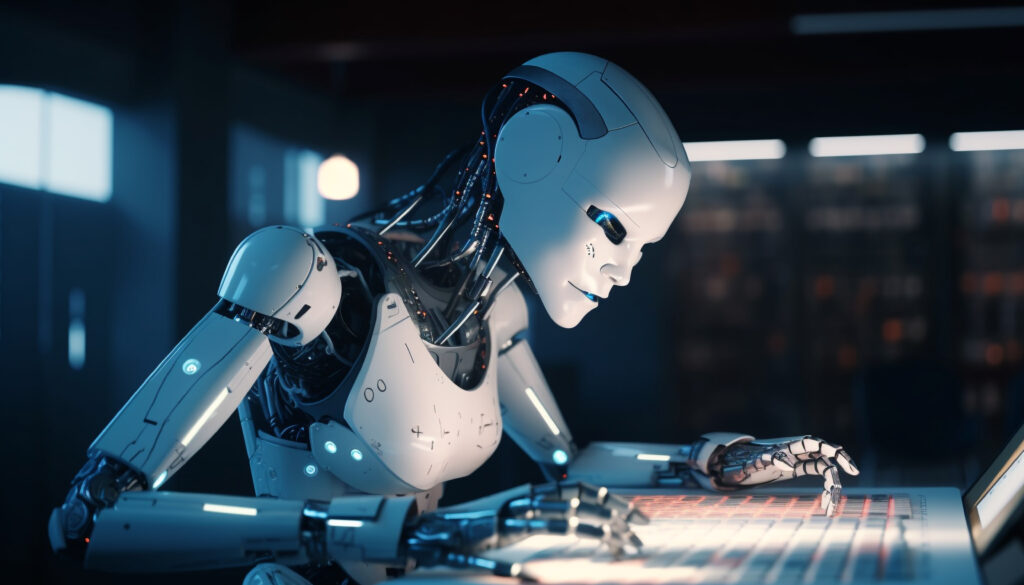AI has indeed been advancing rapidly and is increasingly being used in various industries and job sectors. While AI and automation have the potential to streamline processes, increase efficiency, and improve productivity, they also have implications for the workforce.
Certain jobs that involve repetitive, rule-based tasks are more susceptible to automation. For example, jobs in manufacturing, data entry, customer service, and transportation are being affected by AI and automation technologies. In these cases, AI can perform tasks faster and with greater accuracy than humans.
However, Artificial Intelligence (AI) has a significant impact on employment, both in terms of job displacement and job creation. Here are some key points regarding the impact of AI on employment:
The Influence of Artificial Intelligence on Employment Patterns
Job Displacement:
AI and automation technologies have the potential to replace certain jobs that involve repetitive, rule-based tasks. Jobs in industries such as manufacturing, customer service, data entry, and transportation are being affected as AI can perform these tasks faster and with greater accuracy. This displacement can lead to short-term job losses and challenges for individuals whose skills are directly replaceable by AI.
Job Transformation:
While some jobs may be displaced, AI also leads to the transformation of job roles. Many tasks that can be automated are taken over by AI systems, freeing up human workers to focus on more complex, creative, and higher-value tasks. This shift requires workers to develop new skills and adapt to new job responsibilities.
Job Creation:
The advancement of AI technology also creates new job opportunities. Roles such as AI researchers, machine learning engineers, data scientists, and AI ethicists are in high demand as organizations seek expertise in developing, implementing, and managing AI systems. These emerging job roles require specialized skills and knowledge related to AI technologies.
AI cannot fully replace humans, but it can partially substitute them to a certain extent.
According to a BBC report, the influence of AI will differ across various sectors. It suggests that 46% of tasks in administrative roles and 44% in legal professions have the potential to be automated. However, the figures decrease significantly to only 6% in the construction sector and 4% in maintenance occupations.
New Industries and Opportunities:
AI is enabling the emergence of entirely new industries and business models. As AI technologies continue to evolve, new sectors like autonomous vehicles, healthcare informatics, personalized marketing, and smart home technologies are expanding. These industries require a skilled workforce to develop, maintain, and operate AI-based systems.
AI is transforming last-mile delivery through the use of autonomous vehicles.
Skills Shift:
The adoption of AI necessitates a shift in the required skill sets for the workforce. Skills such as creativity, critical thinking skills, complex problem-solving, emotional intelligence, and the ability to work alongside AI technologies become increasingly valuable. Lifelong learning and adaptability become essential as workers need to continuously update their skills to remain relevant in the evolving job market.
Ethical and Governance Roles:
As AI systems become more pervasive, the need for ethical considerations and responsible AI governance becomes crucial. Jobs related to AI ethics, policy development, and regulatory compliance are emerging to ensure that AI technologies are used ethically, responsibly, and with accountability. It’s important to note that AI is not solely taking away jobs but rather transforming them. While some job roles may diminish, new job opportunities are emerging as a result of AI. These opportunities often involve tasks that require human creativity, critical thinking, emotional intelligence, and complex problem solving—areas where AI currently struggles to match human capabilities.
AI, despite its capabilities, cannot fully match human performance due to its limitation in exercising judgment.
The Influence of Artificial Intelligence on Employment in Call Centers
AI is increasingly impacting the roles of employees working in call centers. AI technologies, such as chatbots and virtual assistants, are being used to automate and handle routine customer inquiries and support. This automation can reduce the need for human call center agents to handle basic queries and tasks.
AI powered chatbots can interact with customers, answer frequently asked questions, and assist with common issues, providing immediate and consistent responses. Virtual assistants can also gather customer information and provide personalized recommendations or solutions. This automation improves efficiency, reduces wait times, and enables 24/7 support.
Artificial Intelligence proving to be far more effective and efficient in customer support than humans.
As stated in a comprehensive report by the Wall Street Journal, the AI assistant handles an astounding volume of 11,400 calls per day, a task that is unachievable for any human. Additionally, the AI agent supports human employees in their daily tasks, including scheduling repair appointments, processing claims, and numerous other responsibilities.
As AI systems become more advanced, they can handle more complex interactions and even mimic human-like conversational abilities. However, there are still limitations to the capabilities of AI when it comes to handling complex or sensitive customer inquiries that require empathy, emotional intelligence, and nuanced understanding. Human call center agents are still needed to handle such interactions and provide the personalized support that AI may struggle to replicate.
Is AI Taking Over Jobs In Data Entry and Processing?
As AI technology advances, it has the potential to replace or reduce the need for manual data entry and processing jobs.
AI is revolutionizing data entry by leveraging advanced technologies to automate and streamline the process. OCR technology, powered by AI, can extract data from physical or digital documents, eliminating the need for manual data entry.
Through automation, AI algorithms can extract relevant information from various sources like invoices, forms, or receipts, thereby reducing human involvement in data entry tasks. Additionally, AI-driven NLP algorithms enable computers to understand and process human language, thereby extracting valuable data from unstructured text sources such as emails, customer feedback, or social media posts.

Robotic systems demonstrate superior efficiency and accuracy compared to human counterparts in the domain of data entry.
AI also plays a vital role in data validation and cleaning, automatically identifying and rectifying errors, inconsistencies, or missing values. By streamlining data transformation tasks, AI can automatically reformat, normalize, or structure data according to predefined rules, minimizing manual efforts in data manipulation. Data entry automation tools, powered by AI and machine learning, learn from human input and offer suggestions or automatically complete data entry fields based on patterns and historical data.
You may also like to read about: Emerging Technology is an Intersection of Humanity and Technology: Brad Waid on AR/VR
As a result, AI-driven data entry systems exhibit increased speed and accuracy, processing large volumes of data swiftly and precisely and, in this way, reducing human errors and enhancing overall data entry efficiency. These advancements in AI-powered data entry not only minimize manual effort but also contribute to improved productivity and data quality.
The Impact of Artificial Intelligence on the Roles of Coding Professionals
AI has made significant advancements in the field of coding and software development, leading to changes in the roles and responsibilities of professionals in this industry. While AI is increasingly being used to automate certain aspects of coding, it is important to understand the nuanced impact it has on coding jobs.
AI tools and technologies, such as automated code generation, code completion, and code analysis, have emerged to streamline the development process and improve productivity. These tools can assist developers by suggesting code snippets, identifying potential bugs, and automating repetitive coding tasks. They can also help with tasks like code refactoring, documentation generation, and software testing.
Certain coding tasks can be automated by AI, but it does not replace the need for skilled human coders. AI technologies currently lack the creativity, problem-solving, and critical thinking skills abilities that human developers possess. Coding involves more than just writing lines of code. It requires understanding complex requirements, designing systems, and making architectural decisions, which still heavily rely on human expertise.
Curriculum Development to Mitigate Job Displacement by AI
Moreover, as AI technology advances, new opportunities are emerging in the field of AI itself. Professionals can focus on developing and improving AI algorithms, designing AI systems, and addressing the ethical implications of AI. The demand for individuals with expertise in machine learning, data science, and AI engineering is growing, creating new job prospects.
To address the potential impact of AI on job automation and help individuals adapt to the changing workforce, here are some curriculum developments that can be considered:

Impact of AI on Curriculum Development
AI Literacy:
Provide foundational knowledge about artificial intelligence, its capabilities, and its impact on various industries. This includes understanding different AI technologies, terminology, and their potential applications.
Data Literacy:
Teach data analysis and interpretation skills to help individuals make informed decisions based on data. This includes understanding how data is collected, processed, and used to train AI systems.
Critical Thinking and Problem Solving:
Emphasize the development of critical thinking skills to solve complex problems that require human judgment, creativity, and strategic thinking. This involves encouraging students to approach challenges from different perspectives and think outside the box.
Will AI Replace Humans?
AI technology itself requires development, implementation, and maintenance, which creates new job roles in fields like data science, machine learning, AI engineering, and ethical AI governance.
To adapt to the changing job market, individuals need to acquire and enhance skills that are less easily automated. Skills such as creativity, adaptability, complex problem-solving, emotional intelligence, and lifelong learning will become increasingly valuable in the age of AI.
Overall, while AI is affecting the job market and may lead to job displacement, it is also creating new opportunities and holds the potential to enhance productivity, improve products and services, and drive economic growth. Society needs to focus on upskilling and reskilling the workforce to ensure that individuals can leverage the benefits of AI and remain relevant in the changing job landscape.















